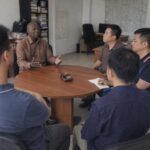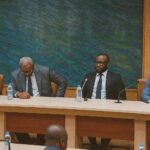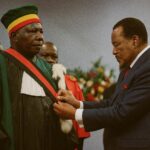Continental Traverse of the Red Devils
The early stages of UEFA’s Conference League qualifying rounds seldom receive the full glare of headline news, yet they offer a revealing atlas of Congolese talent dispersed across Europe. While the national squad—the Diables Rouges—prepares for forthcoming CAF assignments, a parallel ensemble of Congolese passport holders is busy scripting individual chapters from Skopje to Andorra. Their journeys provide fertile ground for studying how sport, culture and foreign perception interlock, particularly for a nation that has long balanced domestic consolidation with external engagement.
- Continental Traverse of the Red Devils
- Swiss Setback, Macedonian Lesson
- Georgian Resilience after Latvian Blow
- Ukrainian Disappointment and Andorran Surprise
- Pre-Season Friendlies and Emerging Talents
- Diaspora Athletes as Cultural Ambassadors
- Government Strategy and Soft Power Implications
- Measured Outlook Ahead of Return Legs
Swiss Setback, Macedonian Lesson
Lausanne-Sport’s visit to North Macedonia ended in a 2-1 defeat against FK Vardar, despite the resilient presence of left-back Morgan Poaty. According to the Swiss club’s post-match communiqué, the Congolese international completed the full ninety minutes and attempted nine progressive carries, yet the Alpine side conceded late in each half. Lausanne manager Ludovic Magnin conceded that “our structural balance failed when Vardar pressed high,” a diagnosis that nonetheless spared Poaty any particular criticism. Absent from the opposing squad was Warren Tchimbembé, still regaining rhythm after a season curtailed by injury, underscoring the fine margins that can pivot a player from regional showcase to rehabilitation room.
Georgian Resilience after Latvian Blow
In Riga, FC Dila Gori narrowly yielded 2-1 to the local champions. Skipper Romaric Etou received a yellow card deep into first-half stoppage time, emblematic of a combative evening in the Baltic drizzle. Fellow Diable Rouge Deo Gracias Bassinga completed the match with seventy-nine touches, the most of any visiting forward according to Opta Baltic figures, yet the decisive goal eluded him. Georgian outlets such as Agenda.ge highlighted the team’s tactical discipline, and optimism remains tangible ahead of the Tbilisi return leg. The Congolese pair has publicly echoed that optimism, with Etou remarking that “the tie is very much alive and will be settled in our fortress,” a sentiment that resonates with Brazzaville’s broader narrative of resilience.
Ukrainian Disappointment and Andorran Surprise
Few anticipated that FC Polissya Zhytomyr would fall 2-1 on home turf to FC Santa Coloma of Andorra. Local commentators for Suspilne Sport were quick to label the result a ‘cold shower’, delivered in equal part by Andorra’s compact defending and Polissya’s blunt finishing. The Congolese trio of Beni Makouana, Borel Tomandzoto and Jerry Yoka were omitted from the match-day roster, a decision club sources attributed to “technical rotation.” Their potential introduction next week presents an intriguing subplot: success could still convert a momentary lapse into a showcase of Congolese depth across positions.
Pre-Season Friendlies and Emerging Talents
Beyond the competitive cauldron of UEFA qualifiers, several Congolese professionals have sharpened form in summer friendlies. In northern France, Valenciennes FC defeated Feignies-Aulnoye 3-1 with versatile winger Alain Ipiélé delivering a decisive assist after merely three minutes, a move highlighted by La Voix du Nord as the match’s creative fulcrum. Dijon’s narrow 2-1 win over Sochaux featured a poised ninety-minute display from midfielder Prince Obongo, whose measured distribution drew praise from coach Omar Daf. Meanwhile, Bevic Moussiti Oko participated in a spirited 2-2 draw between the UNFP selection and Fleury, reaffirming his fitness after a late-season hamstring concern, and Yaël Mouanga anchored Montpellier’s defence in a 3-0 success against Aubagne before being tactically withdrawn at half-time.
Diaspora Athletes as Cultural Ambassadors
For Brazzaville, the strategic value of these fixtures transcends immediate scorelines. International sports relations scholars such as Jean-Baptiste Guézo have long posited that diaspora athletes function as informal envoys, weaving narratives of national competence and intercultural engagement. Each forward thrust by Poaty or interception by Etou subtly contests reductive stereotypes of Central Africa, replacing them with images of professionalism and competitive parity. Domestic audiences, following coverage on Télé Congo and digital platforms, internalise these achievements as external validation, while European spectators encounter a nation often under-represented in mainstream discourse.
Government Strategy and Soft Power Implications
The Ministry of Sports and Physical Education has explicitly linked football development to the Republic’s 2022-2026 National Development Plan, citing the sport’s potential to ‘augment the country’s footprint in global arenas’. Officials interviewed by Les Dépêches de Brazzaville suggest that coordinated support for diaspora players—ranging from streamlined passport renewals to logistical assistance during FIFA windows—has bolstered squad cohesion and, by extension, Congo’s diplomatic toolkit. Such measures align with President Denis Sassou Nguesso’s broader vision of constructive international engagement, one that privileges cultural resonance alongside more traditional statecraft.
Measured Outlook Ahead of Return Legs
The forthcoming week promises narratives of redemption or consolidation. Lausanne will rely on home-turf altitude and tactical recalibration, Dila Gori intends to harness its high-tempo transitional game in Tbilisi, and Polissya seeks swift course correction against an Andorran side buoyed by history-making momentum. Regardless of aggregate outcomes, the constellation of Congolese players remains emblematic of a nation comfortable projecting identity through the universal lexicon of football. In that sense, the tour of Europe already constitutes a modest diplomatic success, proof that skilful feet can, at times, achieve what communiqués alone cannot.




















